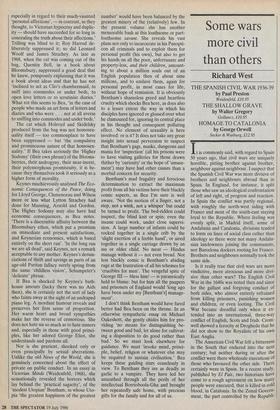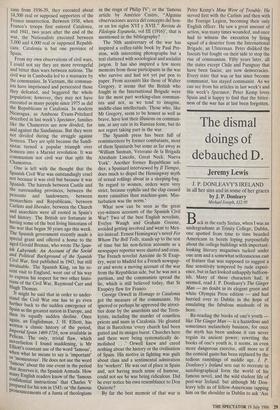Some wars more civil than others
Richard West
THE SPANISH CIVIL WAR 1936-39 by Paul Preston
Weidenfeld, f10.95
THE SHALLOW GRAVE by Walter Gregory
Gollancz, £10.95
HOMAGE TO CATALONIA by George Orwell
Secker & Warburg, f12.95
It is commonly said, with regard to Spain 50 years ago, that civil wars are uniquely horrible, pitting brother against brother, neighbour against neighbour. I suspect that the Spanish Civil War was more divisive of brothers and neighbours abroad than in Spain. In England, for instance, it split those who saw an ideological confrontation of left and right, of progress and reaction. In Spain the conflict was partly regional, with roughly the north-west siding with Franco and most of the south-east staying loyal -to the Republic. Where feeling was evenly split, in Madrid itself, some of Andalusia and Catalonia, divisions tended to form on lines of social class rather than ideology so there were not many Andalu- sian landowners joining the communists, nor Barcelona dockers rooting for Franco. Brothers and neighbours normally took the same side.
Is it really true that civil wars are more vindictive, more atrocious and more divi- sive than other wars? The English Civil War in the 1640s was noted then and since for the gallant and forgiving conduct of both sides, who almost entirely refrained from killing prisoners, punishing women and children, or even looting. The Civil War became dreadful only when it ex- tended into an international, three-way conflict of English, Scots and Irish. Crom- well showed a ferocity at Drogheda that he did not show to the Royalists of his own East Anglia. The American Civil War left a bitterness in the South that endured into the next century; but neither during or after the conflict were there wholesale executions of those who favoured the other side. There certainly were in Spain. In a recent study, published by El Pais, two historians have come to a rough agreement on how many people were executed, that is killed in cold blood, in Catalonia. In the Zonal Govern- ment, the part controlled by the Republi- cans from 1936-39, they executed about 14,500 real or supposed supporters of the Franco insurrection. Between 1938, when Franco's troops first entered Catalonia, and 1941, two years after the end of the war, the Nationalists executed between 3,000 and 4,000 real or supposed Republi- cans. Catalonia is but one province of Spain.
From my own observations of civil wars, I could not say they are more revengeful and bitter than wars between nations. The civil war in Cambodia led to a massacre by the communists. In Vietnam, the commun- ists have imprisoned and persecuted those they defeated, and beggared the whole population; however, they may not have executed as many people since 1975 as did the Republicans in Catalonia. In modern Nicaragua, as Ambrose Evans-Pritchard described in last week's Spectator, families like the Chamorros are now divided, for and against the Sandinistas. But they were not divided during the struggle against Somoza. They are split because the Sandi- nistas turned a popular triumph over Somoza into a Marxist revolution. It was communism not civil war that split the Chamorros.
One is left with the thought that the Spanish Civil War was outstandingly cruel not because it was civil but because it was Spanish. The hatreds between Castile and the surrounding provinces, between the peasants and landowners, between monarchists and Republicans, between Carlists and liberales, between the Church and anarchists were all rooted in Spain's sad history. The British are fortunate in having some of the best living historians of the war that began 50 years ago this week. The Spanish government recently made a special grant and offered a home to the aged Gerald Brenan, who wrote The Span- ish Labyrinth: An Account of the Social and Political Background of the Spanish Civil War, first published in 1943, but still invaluable. The Spanish King, on his re- cent visit to England, went out of his way to express his respect for two other histo- rians of the Civil War, Raymond Can and Hugh Thomas.
It might be said that in order to under- stand the Civil War one has to go even further back to the sudden emergence of Spain as the greatest nation in Europe, and then its equally sudden decline. Once again, an Englishman, J. H. Elliott, has written a classic history of the period, Imperial Spain 1469-1716, now available in Pelican. The only, trivial flaw, which nevertheless I found maddening, is Mr Elliott's constant use of the word 'famous', when what he means to say is 'important' or momentous'. He does not use the word famous' about the one event in the period that deserves it, the Spanish Armada. How many English readers know of the 'famous confidential instructions' that Charles V prepared for his son in 1543; or 'the famous Pronouncements of a Junta of theologians in the reign of Philip IV'; or the 'famous article by Americo Castro, "Algunas observaciones acerca del concepto del hon- or en los siglos XVI y XVII." Revista de Filologia Espanola, vol III (1916)', that is mentioned in the bibliography?
The 50th anniversary of the war has inspired a coffee-table book by Paul Pre- ston, with interesting photographs but a text cluttered with sociological and socialist jargon. It has also inspired a few more memoirs from those participants in the war who survive and had not yet put pen to paper. From accounts like those of Walter Gregory, it seems that the British who fought in the International Brigade were for the most part working-class commun- ists and not, as we tend to imagine, middle-class intellectuals. Those who, like Mr Gregory, seem to be honest as well as brave, have lost their illusions on commun- ism, at any rate in its Russian form, but do not regret taking part in the war.
The Spanish press has been full of reminiscences by former combatants, most of them Spaniards but some as far away as `William Susman, Veterano de la Brigada Abraham Lincoln, Great Neck, Nueva York'. Another former Republican sol- dier, a Spaniard interviewed by 11 Tiempo, does much to dispel the Hemingway myth of sexual rollings about in a sleeping-bag. `In regard to women, orders were very strict, because syphilis and the clap caused more casualties than machine-guns. Mas- turbation was the norm.'
What now can be seen as the great eye-witness accounts of the Spanish Civil War? Two of the best English novelists, Evelyn Waugh and Graham Greene, avoided getting involved and went to Mex- ico instead. Ernest Hemingway's novel For Whom The Bell Tolls, stands up to the test of time but his non-fiction accounts as a newspaper reporter were slanted and crass. The French novelist Antoine de. St Exup- ery, went to Madrid for a French newspap- er and wrote a moving account of the war from the Republican side, but he was not a partisan, and the communists spread the lie, which is still believed today, that St Exupery flew for Franco. George Orwell in Homage to Catalonia got the measure of the communists. He ignored or perhaps he approved the atroci- ties done by the anarchists and the Trots- kyists, including the murder of countless priests and nuns in Catalonia. He gloated that in Barcelona 'every church had been gutted and its images burnt. Churches here and there were being systematically de- molished . . .' Orwell knew and cared nothing about the history or the civilisation of Spain. His motive in fighting was guilt about class and a sentimental admiration for 'workers'. He was out of place in Spain and, not having much sense of humour, could not see he was being ridiculous. Did he ever notice his own resemblance to Don Quixote?
By far the best memoir of that war is Peter Kemp's Mine Were of Trouble. He served first with the Carlists and then with the Foreign Legion, becoming their only English officer. He saw a great amount of action, was many times wounded, and once had to witness the execution by firing squad of a deserter from the International Brigade, an Ulsterman. Peter disliked the fascists but fought on their side to stop the rise of communism. Fifty years later, all the states except Chile and Paraguay that have been fascist, are now democracies. Every state that was or has since become communist, has stayed communist. As we can see from his articles in last week's and this week's Spectator, Peter Kemp loves Spain and is happy to find that the bitter- ness of the war has at last been forgotten.



















































 Previous page
Previous page